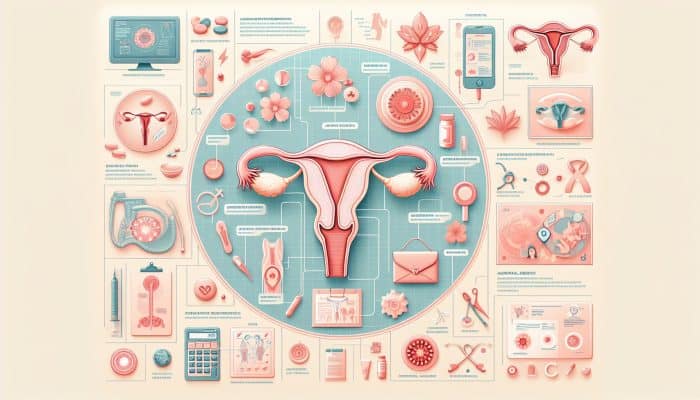Comprehensive Guide to Menstrual Cramps Management
What Factors Contribute to Menstrual Cramps?

Preventing Menstrual Cramps: Menstrual cramps, medically referred to as dysmenorrhea, primarily stem from uterine contractions triggered by prostaglandins—hormone-like substances that are produced during the menstrual cycle. These contractions facilitate the shedding of the uterine lining; however, an excessive production of prostaglandins can lead to severe pain. To effectively manage symptoms, it is essential to understand the underlying mechanisms that drive these cramps. For many women, the discomfort may begin a day or two before the onset of their period and typically persists for 2 to 4 days. Understanding this timeline can help women prepare for and manage their symptoms more effectively.
In the UK, factors such as hormonal imbalances, certain medical conditions like endometriosis, and the presence of fibroids can significantly worsen these cramps. Additionally, lifestyle factors—including diet, stress levels, and physical activity—can also influence the severity of the pain experienced. By recognising the various causes, women can take proactive steps to tailor prevention and management strategies that alleviate discomfort and enhance overall well-being during their menstrual cycle.
What Are the Different Types of Menstrual Cramps?
Menstrual cramps can be classified into two main categories: primary dysmenorrhea and secondary dysmenorrhea. Primary dysmenorrhea refers to typical menstrual cramps that occur without any underlying medical issues; these cramps usually develop shortly after menstruation begins and tend to lessen with age or following childbirth. Conversely, secondary dysmenorrhea arises from specific reproductive organ disorders, including fibroids, pelvic inflammatory disease, or adenomyosis.
Understanding the type of cramps is crucial, as it can significantly affect treatment options. For example, primary dysmenorrhea often responds well to lifestyle changes and over-the-counter pain relief. In contrast, secondary dysmenorrhea may necessitate medical interventions to address the root cause of the pain. Women who experience severe cramps that do not respond to standard treatments are encouraged to consult a healthcare professional for further evaluation and tailored management.
What Are the Most Common Symptoms Experienced in the UK?
In the UK, prevalent symptoms of menstrual cramps include lower abdominal pain, backache, nausea, and sometimes headaches. The intensity of these symptoms can vary widely, ranging from mild discomfort to debilitating pain that disrupts daily activities. Early recognition of these symptoms is crucial, as it enables timely intervention and effective management strategies to be implemented.
For a significant number of women, the pain usually begins 1-2 days before menstruation and peaks during the initial days of the cycle. In some instances, additional symptoms like diarrhoea, fatigue, or mood swings may accompany menstrual cramps. Maintaining a menstrual diary can be particularly beneficial, as it helps women track their symptoms, identify patterns, and recognise triggers, enabling them to seek appropriate care or implement preventive measures more effectively.
What Strategies Can Be Employed to Manage Menstrual Cramps?

Effectively managing menstrual cramps involves a variety of strategies, including heat therapy, over-the-counter pain relief, and targeted lifestyle adjustments. Heat therapy can be easily implemented by using a hot water bottle or heating pad on the lower abdomen, which helps to relax the muscles and alleviate pain.
Common over-the-counter medications such as ibuprofen or paracetamol are frequently recommended for mild to moderate cramps. These medications not only provide pain relief but also help reduce the intensity of menstrual flow by inhibiting prostaglandin production. Alongside medication, lifestyle changes—such as adhering to a healthy diet, engaging in regular physical activity, and implementing stress management techniques—can significantly enhance the quality of life during menstruation. Adjustments to sleep patterns, adequate hydration, and relaxation practices such as yoga or mindfulness can further enhance coping mechanisms and alleviate discomfort.
When Should You Seek Professional Medical Advice for Menstrual Cramps?
It is imperative to seek medical advice if menstrual cramps severely hinder daily activities or if they are accompanied by alarming symptoms such as heavy bleeding or fever. These signs may indicate underlying conditions that necessitate medical intervention. For instance, if cramps progressively worsen over time or are not adequately managed with standard treatments, it could signal endometriosis or other reproductive health concerns requiring professional evaluation.
Early consultation with a healthcare professional can help prevent complications and lead to more effective treatment options. Women are encouraged to maintain open and honest discussions with their healthcare providers about their experiences, as this communication can help develop a management plan that effectively addresses individual needs and circumstances.
Expert Recommendations for Preventing Menstrual Cramps
Real-World Examples from UK Health Professionals

Gaining insights from healthcare professionals specialising in women's health can offer invaluable guidance on preventing menstrual cramps. Below are several case studies shared by UK experts that illustrate effective prevention strategies:
- A study conducted by the Royal College of Obstetricians and Gynaecologists revealed that women who regularly engage in aerobic exercise reported a remarkable 30% reduction in menstrual pain.
- Research from University College London highlighted that women who maintain a balanced diet rich in omega-3 fatty acids experience milder cramps compared to those who consume a higher amount of processed foods.
- Practitioners from the British Journal of General Practice noted that mindfulness and stress-reduction techniques significantly improved the quality of life for patients suffering from severe dysmenorrhea.
- The National Health Service (NHS) has recommended the use of heat therapy, noting that an impressive 70% of women found relief from using hot water bottles or heated patches.
Understanding these real-world applications can significantly enhance the effectiveness of prevention strategies by providing relatable, evidence-based recommendations for managing menstrual cramps more effectively.
Actionable Steps Recommended by UK Specialists
UK specialists have outlined several actionable steps for preventing menstrual cramps that can be seamlessly integrated into everyday routines. Here are some of the most effective strategies:
1. Dietary Adjustments: Incorporating foods high in magnesium (such as nuts and whole grains) and omega-3 fatty acids (like salmon and flaxseeds) can help reduce inflammation and muscle spasms.
2. Regular Exercise: Engaging in at least 30 minutes of aerobic exercise three times a week can improve blood circulation and reduce tension.
3. Stress Management: Practising relaxation techniques such as yoga, tai chi, or deep breathing can significantly lower stress levels, contributing to reduced menstrual pain.
4. Adequate Hydration: Drinking plenty of water helps to alleviate bloating, which can exacerbate cramps.
5. Sleep Hygiene: Prioritising quality sleep and maintaining a regular sleep schedule supports hormonal balance and overall menstrual health.
These steps, when adopted consistently, can lead to tangible improvements in menstrual health, enhancing comfort and minimising the impact of cramps on daily life.
Insights from Recent UK Research on Menstrual Pain Management
Recent research conducted in the UK has illuminated various supplements and medications that show promise in preventing menstrual cramps. Notably, studies have suggested that omega-3 fatty acid supplements can significantly mitigate the severity of cramps due to their anti-inflammatory properties.
Furthermore, a review published in the British Medical Journal indicates that vitamin D supplementation may play a role in alleviating menstrual pain, particularly in women with vitamin D deficiencies. On the pharmacological front, nonsteroidal anti-inflammatory drugs (NSAIDs), such as ibuprofen, continue to be the first line of treatment. However, it is crucial to understand their limitations, as prolonged use may lead to gastrointestinal complications.
Expert analysis suggests that integrating these supplements with lifestyle changes can produce optimal results. Women are encouraged to consult healthcare professionals before commencing any supplementation, ensuring personalised advice tailored to their individual health profiles and needs.
How Can Diet Play a Role in Preventing Menstrual Cramps?
Key Foods to Incorporate into Your Diet
The importance of diet in preventing menstrual cramps cannot be overstated, as certain foods possess anti-inflammatory and muscle-relaxing properties. Incorporating the following essential foods into your daily meals can aid in alleviating menstrual pain:
- Fatty Fish: Rich in omega-3 fatty acids, they help to reduce inflammation.
- Leafy Greens: Varieties such as spinach and kale are rich in magnesium, which is known for helping to combat muscle spasms.
- Nuts and Seeds: Almonds and pumpkin seeds are excellent sources of magnesium and vitamin E.
- Berries, such as blueberries and raspberries, are rich in antioxidants that can help reduce inflammation.
- Dark Chocolate: Contains magnesium and can provide a pleasant energy boost during menstruation.
- Herbs and Spices: Ginger and turmeric possess anti-inflammatory properties that may alleviate pain.
- Whole Grains: Foods like brown rice and quinoa are beneficial for hormonal balance and stabilising blood sugar levels.
- Legumes, including beans and lentils, provide protein and essential nutrients that support overall health.
Incorporating these foods into your diet can not only help prevent menstrual cramps but also enhance overall health and well-being, making them a vital component of menstrual health management.
Which Foods Should Be Avoided for Improved Menstrual Health?
To optimise menstrual health, it is equally important to be aware of foods that can exacerbate cramps. Certain dietary choices can lead to increased inflammation or hormonal imbalances. Women in the UK should consider limiting or avoiding the following:
– Processed Foods: Often high in sugar and unhealthy fats, these can worsen inflammation.
– High-Sugar Items: Foods rich in refined sugars can lead to blood sugar spikes and crashes, aggravating cramps.
– Caffeine: Found in coffee, tea, and soft drinks, caffeine can constrict blood vessels and worsen pain.
– Salty Foods: High sodium intake can lead to water retention and bloating, amplifying discomfort.
– Dairy Products: Some studies suggest that dairy may increase inflammation and cramping for certain individuals.
By avoiding these foods, individuals can support their menstrual health and potentially reduce the severity of cramps during their cycle, paving the way for a more comfortable experience.
What Are the Advantages of Maintaining a Balanced Diet?
A balanced diet offers numerous benefits that extend beyond merely preventing menstrual cramps. Consuming a variety of nutrients supports hormonal balance, promotes energy levels, and enhances mood stability during menstruation. A well-rounded diet helps in maintaining an optimal weight, which can further reduce the severity of cramps.
Moreover, a balanced diet rich in fruits, vegetables, whole grains, and lean proteins can help regulate blood sugar levels, reducing irritability and fatigue commonly associated with the menstrual cycle. Overall, prioritising a nutritious diet not only aids in preventing cramps but also promotes general health, making it essential for women to consider their dietary choices throughout the month carefully.
How Does Exercise Contribute to Preventing Menstrual Cramps?
Which Types of Exercise Are Most Beneficial?
Regular exercise can serve as a powerful tool in preventing menstrual cramps by promoting blood flow and reducing tension throughout the body. Aerobic exercises, in particular, are highly effective. Activities such as swimming, cycling, and brisk walking have been shown to alleviate menstrual pain due to their ability to enhance circulation and release endorphins—natural painkillers produced by the body.
In addition to aerobic workouts, strength training also plays a beneficial role. Engaging in resistance exercises helps to strengthen core muscles, which can support improved posture and reduce back pain associated with cramps. Furthermore, practices like yoga and pilates emphasise flexibility and relaxation, enhancing both physical and mental well-being during menstruation.
Regular participation in these types of exercise not only aids in managing cramps but also improves overall fitness, energy levels, and mood, providing a comprehensive approach to menstrual health.
How Frequently Should You Engage in Exercise?
To effectively prevent menstrual cramps, it is recommended to engage in exercise at least three times a week. Consistency is paramount; establishing a routine allows the body to adapt and respond positively to physical activity. This frequency enables the maintenance of hormonal balance and supports cardiovascular health, both of which are crucial for reducing menstrual pain.
Incorporating a combination of aerobic and strength-training exercises can maximise benefits. For instance, dedicating 150 minutes per week to moderate aerobic activity, alongside two days of muscle-strengthening exercises, can yield significant improvements in menstrual health. Women are encouraged to listen to their bodies, as rest and recovery are equally important, particularly during menstruation when fatigue may be more pronounced.
Can Yoga Be Effective in Preventing Menstrual Cramps?
Yoga can be particularly effective in preventing and alleviating menstrual cramps due to its emphasis on relaxation, flexibility, and breath control. Specific yoga poses, such as Child’s Pose, Cat-Cow, and Legs-Up-the-Wall, can help relieve tension in the lower abdomen and back, thereby reducing pain. The focus on mindfulness in yoga also aids in stress management, which is crucial for minimising the severity of cramps.
Research indicates that women who practise yoga regularly experience fewer menstrual cramps and report improved overall well-being during their menstrual cycle. Integrating a dedicated yoga practice into one’s routine can not only alleviate menstrual symptoms but also enhance mental clarity and emotional balance. Consequently, yoga serves as a holistic approach to menstrual health, merging physical activity with stress reduction.
Proven Strategies for Preventing Menstrual Cramps
Implementing Heat Therapy for Relief
One of the simplest yet most effective strategies for managing menstrual cramps is the application of heat therapy. Applying heat to the lower abdomen can help relax the muscles and alleviate pain by increasing blood flow to the area. This method is widely employed in the UK, with common practices including the use of hot water bottles, heating pads, or even warm baths.
Research suggests that heat therapy can be as effective as over-the-counter pain medications in reducing menstrual pain. It is a low-cost, non-invasive method that women can easily incorporate into their self-care routines. To maximise effectiveness, heat therapy should be applied for 15-20 minutes at a time, ensuring regular intervals throughout the day for optimal results.
Utilising Over-the-Counter Medications Wisely
In the UK, over-the-counter medications such as ibuprofen and paracetamol are commonly employed to manage menstrual cramps. These nonsteroidal anti-inflammatory drugs (NSAIDs) function by reducing the production of prostaglandins, which are responsible for the painful contractions of the uterus. Understanding the appropriate use of these medications is crucial for effective pain management.
Women are advised to adhere to the recommended dosage and be aware of potential side effects, such as gastrointestinal discomfort. While these medications are effective for many, they may not be suitable for everyone. Consultation with a healthcare provider is recommended, especially for those with pre-existing health conditions or those taking other medications, to ensure safe and effective use of pain relief options.
What Is the Importance of Stress Management in Menstrual Pain Relief?
Stress management plays a pivotal role in alleviating menstrual cramps. Elevated stress levels can lead to increased muscle tension and hormonal imbalances, exacerbating pain. Techniques such as meditation, deep breathing exercises, and progressive muscle relaxation can significantly help manage stress levels, thereby reducing the severity of cramps.
Engaging in self-care activities, such as pursuing hobbies, spending quality time with loved ones, or simply enjoying quiet moments of solitude, can also contribute to lower stress levels. Regular participation in stress-reducing activities not only enhances emotional well-being but also yields physical benefits, including reduced menstrual pain. By prioritising stress management, women can gain better control over their menstrual health and overall quality of life.
Exploring Alternative Therapies in the UK for Menstrual Cramps
Understanding the Benefits of Acupuncture
Acupuncture is an increasingly popular alternative therapy in the UK for managing menstrual cramps. This ancient practice involves inserting thin needles at specific points on the body to stimulate the flow of energy and promote healing. Research has shown that acupuncture can significantly reduce the intensity of menstrual pain and enhance overall quality of life during menstruation.
The advantages of acupuncture include increased blood circulation to the pelvic region, which helps alleviate cramps and discomfort. Many women report experiencing fewer side effects compared to conventional pain medications, making acupuncture an appealing option for those seeking alternative treatments. However, it is essential to seek out a qualified practitioner who adheres to safety standards and best practices in acupuncture.
Exploring Herbal Remedies Available in the UK
In the UK, a variety of herbal remedies are used for their anti-inflammatory properties, which can aid in alleviating menstrual pain. Herbs such as ginger and chamomile have been traditionally employed for their soothing effects. Ginger, in particular, is renowned for its anti-inflammatory and pain-relieving properties; it can be consumed as tea or in supplement form to provide relief from cramps.
Chamomile, renowned for its calming effects, can help alleviate tension and promote relaxation, thereby reducing menstrual discomfort. Other herbs, such as cramp bark and raspberry leaf, are also popular for their potential benefits in reducing menstrual pain. As with any herbal treatment, women should consult a healthcare professional to ensure safety and appropriateness for their individual health needs before starting any herbal regimen.
Are Essential Oils Effective for Menstrual Pain Relief?
Essential oils, such as lavender and clary sage, have gained popularity in the UK for their calming effects and potential in alleviating menstrual cramps. Lavender oil, renowned for its relaxing properties, can be diffused in the air or applied topically with a carrier oil to help soothe pain. Its aroma has a calming influence, which may help mitigate stress and anxiety commonly associated with menstruation.
Clary sage oil is another essential oil that may help alleviate menstrual pain through its antispasmodic properties. Adding a few drops of these oils to a warm bath or using them in a massage can enhance relaxation and provide significant relief. However, it is crucial to perform a patch test before applying topical treatment to identify any adverse reactions.
Exploring Homeopathy for Menstrual Relief
Homeopathy is a complementary approach utilised by some women in the UK to alleviate menstrual pain. This treatment involves the use of highly diluted substances designed to stimulate the body's natural healing processes. Homeopathic remedies such as Pulsatilla and Cimicifuga are often prescribed for menstrual cramps, targeting specific symptoms experienced by the individual.
An advantage of homeopathy is its holistic approach, which considers the physical, emotional, and mental aspects of menstrual health. While some women report positive results, it is essential to consult with a qualified homeopath who can tailor treatments to individual needs for optimal effectiveness and safety.
The Role of Reflexology in Menstrual Health
Reflexology, a therapy that involves applying pressure to specific points on the feet, is utilised in the UK to manage menstrual discomfort. Proponents believe that these pressure points correspond to various body parts, including the reproductive organs, and can help alleviate pain and promote overall well-being.
Regular reflexology sessions can help reduce stress, improve circulation, and balance hormonal levels, all of which are beneficial for menstrual health. Many women find reflexology to be a soothing and effective complementary therapy, particularly during their menstrual cycle. As with any alternative therapy, seeking a qualified reflexologist is essential for safe and effective practice.
Frequently Asked Questions About Menstrual Cramps
What are menstrual cramps, and how do they manifest?
Menstrual cramps, or dysmenorrhea, refer to the pain experienced during menstruation, often characterised by lower abdominal pain, backache, and various related symptoms that can interfere with daily life.
How can I effectively prevent menstrual cramps?
Preventing menstrual cramps can involve adopting a balanced diet, engaging in regular exercise, managing stress, and utilising heat therapy or over-the-counter medications as needed.
When should I consult a doctor regarding menstrual pain?
If menstrual cramps severely impact daily activities, are accompanied by heavy bleeding, or worsen over time, it is advisable to consult a healthcare professional for further evaluation and management.
Can dietary changes significantly impact menstrual cramps?
Yes, incorporating anti-inflammatory foods such as omega-3 fatty acids, leafy greens, and whole grains into your diet can help alleviate menstrual pain and improve overall menstrual health.
Is exercise beneficial in reducing menstrual cramps?
Regular exercise can significantly reduce the severity of menstrual cramps by improving blood circulation and releasing endorphins, which act as natural painkillers.
What alternative therapies may assist with menstrual cramps?
Alternative therapies such as acupuncture, herbal remedies, and reflexology may provide effective relief from menstrual cramps for some women, depending on individual responses.
Are there specific yoga poses recommended for alleviating menstrual pain?
Yes, certain yoga poses, such as Child’s Pose, Cat-Cow, and Legs-Up-the-Wall, can help relieve tension and reduce menstrual pain effectively.
What role does stress play in exacerbating menstrual cramps?
High stress levels can worsen menstrual cramps by increasing muscle tension and hormonal imbalances, making stress management crucial for effective pain relief.
How effective are over-the-counter medications in managing menstrual cramps?
Over-the-counter medications like ibuprofen and paracetamol are commonly effective in managing menstrual cramps but should be taken as directed and with an awareness of potential side effects.
Can essential oils provide relief from menstrual pain?
Yes, essential oils such as lavender and clary sage may help alleviate menstrual pain when used in aromatherapy or topical applications, enhancing comfort during menstruation.


